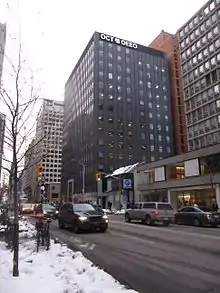Ontario College of Teachers
The Ontario College of Teachers (OCT; French: Ordre des enseignantes et des enseignants de l'Ontario [OEEO]) is the regulatory college for the teaching profession in Ontario and is the largest self-regulatory body in Canada. It was established on 20 May 1997.[2] The college's mandate is to license, govern and regulate the practice of teaching. It is also responsible for developing standards of teaching practice, regulating ongoing teacher certification and professional development, and accrediting teacher education programs. The College of Teachers also has the responsibility to investigate claims of misconduct made against teachers. The Ontario College of Teachers is also mandated to communicate with the public on behalf of the profession, which it does primarily through its website.
 | |
| Abbreviation | OCT |
|---|---|
| Formation | 20 May 1997 |
| Type | Professional regulatory body |
| Headquarters | Toronto, Ontario, Canada |
| Location |
|
Chair | Diana Miles |
Registrar | Chantal Bélisle (interim) |
Revenue (2016) | $38.4 million[1] |
| Expenses (2016) | $38.1 million[1] |
| Website | oct |
Teachers and principals employed by publicly funded schools (primary or secondary, English or French, "public" or Catholic) are required to be members of the college in good standing. College membership is not compulsory for teaching in a private school, but some schools might require it and some teachers are members voluntarily. The college maintains a database of teachers and their qualifications, which is available to the public on the college's website.[3]
Public interest

The college has a duty to serve and protect the public interest, but is often criticised for being an extension of the government.[4] The public has elected representatives on the college council which allows input into the operation of the college.[4] College policies and initiatives are developed to maintain and improve excellence as perceived by the members of the council and council administration. Disciplinary hearings are open to the public but are not normally available to the public as cases are transferred to the Toronto administrative buildings in downtown Toronto.[5] The college offers its members and the public copies of discipline committee decisions that are heavily edited by staff and posted on its website, in its quarterly magazine, Professionally Speaking, and through the college's Margaret Wilson Library.
Governance
The college is governed by a 37-member council, 23 of whose members are teachers' federation–endorsed members of the college elected under direction by the Ontario Teachers' Federation by their peers for three-year terms. Less than five per cent of teachers throughout the province have voted during the Ontario College of Teachers elections. Elected members represent the English, French, Catholic, public, elementary and secondary school systems in all regions of the province. The other 14 members of the council are appointed by the Ontario Lieutenant Governor in Council for terms of up to three years. The college council meets four times a year to develop and approve policies and procedures.[6] As of 2016, the council is chaired by Angela De Palma.[7]
Secrecy
In 2011, the Ontario College of Teachers was criticized for keeping secret the names of teachers who were allowed to teach in Ontario classrooms even after committing crimes against children.[8][9] The Toronto Star found that out of 49 cases published by the Ontario College of Teachers in 2010, 35 such cases kept the teacher anonymous.[10]
In the summer of 2011, the college commissioned former Ontario Chief Justice Patrick LeSage to evaluate its discipline processes and practices. Nine months and 49 recommendations later, he has given the college a self-endorsed mandate. No parents, parent groups, parent councils, victims of abuse by educators or critics of the college were asked to submit concerns. The report cost $500,000 and was paid for by the teachers of the province.[11] In June 2012, the college council approved the recommendations including a recommendations that allows repeat sex offenders to return to teaching after five years.
Since the Toronto Star started an investigation of the cases held secret by the Ontario College of Teachers, the Ontario government has made the Ontario College of Teachers publish any cases that have been held in public hearings. This does not include cases that have been determined by closed door legal agreements.[12] Therefore, parents may now determine if their child's teacher who has passed a criminal record check has in fact been found guilty of such crimes as sexual assault,[8] kidnapping,[8] physical assault, impaired driving and so on. Parents may now be able to place the teacher's name in the discipline registry to determine if their child is being taught by a convicted criminal.
See also
References
- 2016 Annual Report (PDF). Toronto: Ontario College of Teachers. 2017. p. 69. Retrieved 27 May 2018.
- "History of the Ontario College of Teachers". Toronto: Ontario College of Teachers. Retrieved 27 May 2018.
- "Find a Teacher". Ontario College of Teachers. Retrieved 9 January 2010.
- "Law Document English View". 24 July 2014.
- "'Teacher's Pet': A Guide to Teacher Discipline Cases". The Fifth Estate. Canadian Broadcasting Corporation. 2008. Archived from the original on 7 November 2012. Retrieved 27 May 2018.
- "eVote 2012". election.oct.ca. Archived from the original on 2012-11-11.
- 2016 Annual Report (PDF). Toronto: Ontario College of Teachers. 2017. p. 3. Retrieved 27 May 2018.
- http://www.oct.ca/ShowDocument.sample?documentType=Decision&id=4&lang=E
- http://www.oct.ca/ShowDocument.sample?documentType=Decision&id=601&lang=E
- Donovan, Kevin (29 September 2011). "Bad Teachers: Ontario's Secret List". Toronto Star. Retrieved 27 May 2018.
- LeSage, Patrick J. (2012). Review of the Ontario College of Teachers Intake, Investigation and Discipline Procedures and Outcomes, and the Dispute Resolution Problem (PDF). Toronto: Ontario College of Teachers. Retrieved 27 May 2018.
- "| Ontario College of Teachers".